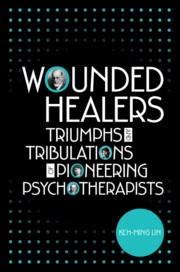Book contents
- Wounded Healers
- Advance Praise for Wounded Healers
- Wounded Healers
- Copyright page
- Contents
- Acknowledgments
- Introduction
- Part I Fin-de-Siècle Vienna
- 1 Sometimes a Cigar Is Just a Cigar
- 2 A Most Dangerous Method
- 3 We Are Abel: We Are Cain
- 4 Fear of Death and Trauma of Birth
- 5 From Character Analysis to Cloud Busting
- 6 Ernest Jones
- 7 Estranged Brilliance
- 8 When Freud Met Tiffany
- 9 Phoenix Forever
- Part II From Sea to Shining Sea
- References
- Index
7 - Estranged Brilliance
Melanie Klein’s Legacy
from Part I - Fin-de-Siècle Vienna
Published online by Cambridge University Press: 17 December 2020
- Wounded Healers
- Advance Praise for Wounded Healers
- Wounded Healers
- Copyright page
- Contents
- Acknowledgments
- Introduction
- Part I Fin-de-Siècle Vienna
- 1 Sometimes a Cigar Is Just a Cigar
- 2 A Most Dangerous Method
- 3 We Are Abel: We Are Cain
- 4 Fear of Death and Trauma of Birth
- 5 From Character Analysis to Cloud Busting
- 6 Ernest Jones
- 7 Estranged Brilliance
- 8 When Freud Met Tiffany
- 9 Phoenix Forever
- Part II From Sea to Shining Sea
- References
- Index
Summary
Melanie Klein was the first child psychoanalyst who delineated the rich and astounding inner lives of infants and young children and demonstrated the fundamental importance of mothers’ roles in human development. She was one of the founders of the “object relation theory” school, and her concepts – including “projective identification,” “depressive position,” and “paranoid-schizophrenic position” – have remained influential in clinical practice. Klein grew up in an impoverished immigrant family and suffered from multiple losses during her childhood and young adulthood, including the death of her father and two of her siblings. During most of her adult life, she was weighed down by a very difficult marriage, as well as estrangement from her own children. Her decades’ long fights with Anna Freud made life even more difficult for her (and for others). Yet, she survived it all and went on to make major contributions. This chapter provides a sketch of Klein’s life, focusing on various difficulties confronting her throughout her life, and their relationship with her insights and contributions.
Keywords
- Type
- Chapter
- Information
- Wounded HealersTribulations and Triumphs of Pioneering Psychotherapists, pp. 93 - 106Publisher: Cambridge University PressPrint publication year: 2020

